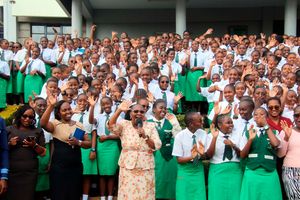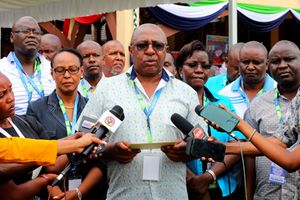
Kenya Secondary Schools Heads Association (KESSHA) chairperson Willy Kuria.
Secondary school principals have refuted claims by the government that it has sent schools the full capitation funds for the first term, saying schools are owed a total of Sh7 billion in unremitted capitation.
The Kenya Secondary School Heads Association (Kessha) says institutions are yet to receive the full amount with two weeks left to the end of the term. Schools are scheduled to close on April 4, 2025.
The association urged the Ministry of Education to prioritise the financial gap to ensure the smooth running of schools and the continued well-being of thousands of learners across the country.
On Monday, Education Cabinet Secretary Julius Ogamba directed all schools to release KCPE and KCSE exam certificates withheld due to fees arrears. He said withholding the documents was illegal.
“It is important to note that the said fees arrears constitute services already rendered and goods already enjoyed by the student, but whose burden is unfairly borne by the schools whose financial situation is already constrained,” said Kessha chairperson Willy Kuria.
Mr Ogamba announced that the State had disbursed Sh14 billion to secondary schools to clear outstanding capitation for the first term. However, the principals say the ministry has only disbursed half of the capitation expected.
“As we approach the end of the term, schools are still owed Sh2,303 per learner for the first term of 2025. We would like to respectfully remind the Ministry of Education that this amount is not the full capitation entitlement for our learners,” said Mr Kuria.
Cumulatively, he said, secondary schools are owed Sh7 billion in unremitted capitation for Term 1.
“The Sh7 billion is in addition to Sh60 billion owed to the Ministry of Education by the National Treasury in unfunded students by 2023,” he added.
In a statement to newsrooms, Mr Kuria said schools are grappling with the challenges of paying staff salaries and honouring statutory deductions for workers and staff employed by boards of management.
“This has opened a floodgate of lawsuits against schools,” he added.
Mr Kuria said that using the 2024 Ministry of Education data, there are three million students in secondary schools. The total annual capitation per learner is Sh22,244, with 50 percent or Sh11,122 expected to be disbursed in the first term.
The Murang’a High School chief principal said the Ministry of Education has disbursed the first term capitation to secondary schools, amounting to Sh8,819 per learner.
“This disbursement is appreciated. The funds have played a crucial role in supporting the operations of our schools, especially coming at a time when secondary schools are beset with many pending bills amidst an inflationary spiral and the general rise in the cost of goods and services,” he said.
However, secondary schools are on the verge of premature closure, Mr Kuria said.
“The factual information also seeks to timely disabuse stakeholders in the education sector of the notion that full capitation has been disbursed as has been pronounced by the ministry and subsequently amplified by sections of the media,” he said.
The association said the capitation disbursement formula is supposed to be 50 percent of Sh22,244 disbursed in Term 1, which is Sh11,122, 30 percent disbursed in Term 2, amounting to Sh6,673 and 20 percent in Term ,3 which is Sh4,448.
“If we apply the above formula, then it means that with the figure of Sh8,819 per learner having been disbursed against an expected figure of Sh11,122, it amounts to 78.6 percent of the total expected disbursement for Term 1,” he said.
According to the principals, 21 percent of Term 1 capitation is yet to be disbursed to schools, which is equivalent to Sh2,303 per learner.
He said Sh2,000 has been committed to infrastructure development, which is an encroachment on operations vote heads, further exacerbating the financial crisis in schools.
“Further, it is not the full amount of Sh8,819 that has been distributed to schools since there are monies that are retained at the ministry, Sh100 per learner was remitted to the Centre for Mathematics, Science and Technology Education in Africa (CEMASTEA), for capacity building,” he added.
Others are Sh325 per learner retained for co-curricular activities.
He said that in the years 2021 to 2023 alone, a total of Sh25 billion was retained by the ministry.
Principals suggest the “vacation of the directive to retain infrastructure funds from capitation. Alternative ways of raising funds should be sought and encouraged for infrastructure development in schools and also for offsetting old debts.”
Mr Kuria said the government should release the entire capitation at the approved rate of Sh22,244 per child without any retention by the ministry.
The principals also want the state to adhere to the disbursement formula of releasing capitation in tranches of 50 percent in Term 1, 30 percent in Term 2 and 20 percent in Term 3.
“The financial crisis further deepens because schools have no form ones in the year 2025 and therefore advantages that accrue from economies of scale about fixed costs are not tenable in the year 2025,” Mr Kuria said.
“Factor in total enrolment in secondary schools and disburse capitation at the approved rate for all students in public secondary schools. At present, capitation disbursement is based on the previous year's enrolment, which is normally subject to many dynamics in the subsequent year.”
At the same time, the principals criticised a government directive to release KCSE certificates to students who owe fees.
“The Ministry of Education should advise schools on measures to take where Form 4 students exit with fees arrears. At the moment, schools are stopped from withholding Form 4 certificates,” Mr Kuria said.
The principals also want the state to review the capitation, boarding and lunch fees in public secondary schools to factor in inflation and the need to continuously improve the learning environment to enhance the quality of education.
“The aforementioned issues are of grave concern to the effective provision of quality education in secondary schools and if they are not addressed, compromises will be made to the detriment of learners' well-being,” said Mr Kuria.











